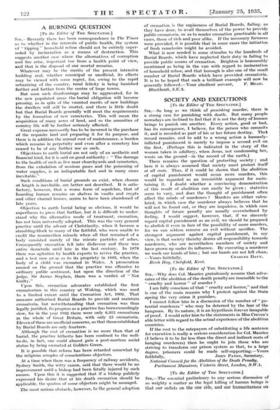A BURNING QUESTION [To the Editor of THE SPECTATOR.] Sin,—Recently
there has been correspondence in The Times as to whether in the interests of public health, the system
of tipping " household refuse should not be entirely super- seded by incineration as a means of destruction. This suggests another case where the alternatives of corruption and fire arise, important too from a health point of view, and that is the disposal of our mortal remains.
Whatever may be the merits of the present intensive building zeal, whether municipal or unofficial, its effects may be viewed with some regret, for, owing to the rapid urbanizing of the country, rural felicity is being banished farther and farther from the centre of large towns.
But soon such disadvantage may be aggravated, for in the new populated areas the burial obligation will become pressing, as in spite of the vaunted merits of new buildings the dwellers will still be mortal, and there is little doubt but that Burial Boards generally will meet the requirements by the formation of new cemeteries. This will mean the acquisition of many acres of land, and so the amenities of country life will be further seriously affected.
Great expense necessarily has to be incurred in the purchase of the requisite land and preparing it for its purpose, and there is in addition the annual cost of maintenance, a burden which remains in perpetuity and even after a cemetery has ceased to be of any further use as such.
Objections to earth burial are not only of an aesthetic and financial kind, for it is said on good authority : " The damage to the health of such as live near churchyards and cemeteries, from the exhalation of noxious gases and the poisoning of water supplies, is an indisputable fact and in many cases inevitable."
Such conditions of burial grounds as exist, when closure at length is inevitable, are better not described. It is satis- factory, however, that a worse form of sepulchre, that of hoarding human remains on shelves in vaults and crypts and other charnel houses, seems to have been abandoned of late years. Objection to earth burial being so obvious, it would be superfluous to press that further, but it is difficult to under-. Stand why the alternative mode of treatment, cremation, has not been universally adopted. This was the very general practice until the advent of Christianity, when it became a stumbling-block to many of the faithful, who were unable to credit the resurrection miracle when all that remained of a body consisted merely of the minute particles of ashes. Consequently cremation fell into disfavour and there was entire desuetude until late in the last century. In 1878 there was agitation by health experts to revive the practice, and a test case arc se as to its propriety in 1883, when the body of a child Ens cremated in Wales. A prosecution ensued on the ground that the practice was offensive to ordinary public sentiment, but upon the direction of the judge, Sir James Stephen, there was a verdict of " Not Guilty."
Upon this, cremation advocates established the first crematorium in this country at Woking, which was used to a limited extent until the Cremation Act, 1902. That measure authorized Burial Boards to provide and maintain crematoria, but notwithstanding that cremation was thus legally justified, its progress as a practice has been exceedingly slow, for in the year 1932 there were only 6,315 cremations in the whole of Great Britain, with only 25 crematoria. Eleven of these are unofficial concerns, so that those established by Burial Boards are only fourteen.
Although the cost of cremation is no more than that of burial, the practice hitherto has been confined to the well- to-do, in fact, one could almost gain a post-mortem social status by being cremated at Golders Green.
It is possible that reform has been retarded somewhat by the religious scruples of conscientious objectors.
At a time when there was a frequency of railway accidents, Sydney Smith, the witty canon, said that there would be no improvement until a bishop had been fatally injured by such means. Upon this it is suggested that if a bishop publicly expressed his desire that at his death cremation should be applicable, the qualms of some objectors might be assuaged.
The most serious obstacle, however, to the general adoption of cremation is the supineness of Burial Boards, failing, as they have done, to avail themselves of the power to provide public crematoria, so as to render cremation practicable in all cases, those of rich and poor alike. If the necessary furnaces were provided, it is possible that in some cases the initiation of fresh cemeteries might be avoided.
What is now needed is some stimulus to the hundreds of Burial Boards, which have neglected their duty in failing to provide public means of cremation. Brighton is honourably mentioned as being in the van with regard to incineration of household refuse, and that borough is also one of the small number of Burial Boartls which have provided crematoria. It is to be hoped that such a brilliant example will now be
generally followed.—Your obedient servant, F. MEAD. Blackheath, S.E. 8.














































 Previous page
Previous page